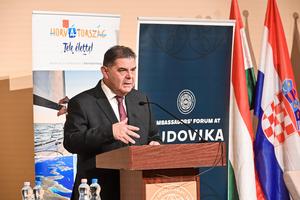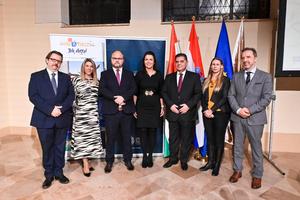The last guest of this year's Ludovika Ambassador’s Forum series at the Ludovika University of Public Service (LUPS) was Mladen Andrlić, Ambassador of Croatia in Budapest on December 4, 2023.
The event, organized by the Regional Cooperation Department and realized with the cooperation of the International Office, was not only about the historical significance of the close relations between the two countries, but also the 10th anniversary of Croatia's accession to the EU, as well as the introduction of the euro and accession to the Schengen area this year.
In her welcome speech, Vice Rector for International Affairs Boglárka Koller emphasized that one of the strategic goals of the university is the development of international partnerships, which is closely linked to the promotion and improvement of relations between countries. The Ludovika Ambassador’s Forum provides an excellent opportunity for this, where different ideas and perspectives meet in order to promote international cooperation and understanding. Within the framework of the forum, the University strives to find new ways for innovative solutions to multifaceted problems that cross borders at the intersection of academic life, diplomacy and society.
The international vice-rector emphasized that the Croatian-Hungarian relations are of historical importance, that the two nations share such defining personalities as a common heritage, such as Saint Ladislaus, Miklós Zrínyi or the writer and poet Miroslav Krleža, who was a student of the former Royal Hungarian Ludovika Defence Academy.
In terms of inter-university relations, the Ludovika University of Public Service has intensive cooperation with several Croatian higher education institutions, so in addition to Zagreb, the universities of Rijeka and Osijek, as well as the Croatian Defence Academy, participate in the implementation of joint programs. Within the framework of the Ludovika Scholars Program, Jonathan Lerga, deputy dean of the University of Rijeka, was a guest of LUPS through his research related to artificial intelligence and cyber security. Of course, all this is not enough, "we are committed to increasing these numbers, and I would like to emphasize that we intend to further expand the bilateral cooperation with Croatian universities and research institutes", concluded Boglárka Koller.
In his keynote speech, Mladen Andrlić showed that Croatia had an extremely difficult and long journey to the European Union and NATO, during which the support of friends and neighbours was very important, so Croatia is especially grateful for the help Hungary provided. Since Croatia joined the EU in 2013, extraordinary growth and development have been experienced. The economy has strengthened, creating new opportunities for companies and individuals, making Croatia one of the 38 most developed economies according to the IMF. This year's accession to the euro zone and the Schengen zone contributed to this. Croatia's credit rating and investment grade are the highest of all three major agencies, with Moody's latest report changing the outlook from stable to positive. Thus, the country's next outstanding strategic goal is to become a member of the OECD.
The ambassador emphasized: Croatia remains committed to the European values of democracy, freedom and solidarity, and sees national sovereignty as strengthened within the framework of the EU and NATO. Therefore, Croatia suggests that the most important EU decisions should remain in the area of unanimity, which may protect better national interests than a possible switch to the Quality Majority Voting. "At the same time, over-voting on the most sensitive decisions could weaken the legitimacy of the member states and lead to the opposite of the strengthening unity," stressed Mladen Andrlić.
Regarding the EU enlargements, he emphasized that they cannot be separated from the issue of the internal reforms of the candidates, so progress primarily depends not only on EU decisions, but also on the candidates' own efforts and willingness to reform internally. With regard to Bosnia-Herzegovina, Croatia supports the opening of negotiations, as well as further progress in the case of Albania and North Macedonia. Regarding Serbia, he emphasized that progress is needed on many issues, so not only internal changes, but also coordination with the EU's common foreign and security policy cannot be left behind, for example, in the area of sanctions against Russia or regarding Kosovo.
Turning to bilateral relations, he emphasized that there are not only success stories in terms of societies and minority affairs, but bilateral trade is also extremely strong, amounting to 5.7 billion euros. Dynamic development can be seen in energy matters, including through MOL and the LNG terminal on the island of Krk. In the field of security policy, the continuous bilateral exchange of ideas is also supported by the multinational divisional centre of the NATO command in Székesfehérvár. Ambassador Andrlić emphasized that he is looking forward to the Hungarian EU presidency, which will take place after the EU parliamentary elections. Thus, "it will be important to ensure an effective and smooth transition, which enables the proper functioning of the newly elected European Parliament and the European Commission, as well as the management of institutional changes," concluded the ambassador.
After the keynote speech, Ivana Herceg, director of the Croatian National Tourist Board in Budapest, presented the Croatian tourist and cultural opportunities to the interested audience. In her presentation, which was coloured with pictures of wonderful natural and outstanding architectural and cultural sites, she not only concentrated on the destinations favoured by Hungarians, but tried to outline the attractiveness of all 10 major Croatian tourist regions in a balanced way. She pointed out that a new strategy in the field of tourism will also be necessary in the future, since the country of four million now welcomes more than 20 million guests a year, and most of them visit the country in the summer months.
During the round table discussion moderated by Péter Zachar, vice dean for international affairs of the Faculty of Public Governance and International Studies, together with Ambassador Mladen Andrlić, Ivana Herceg, and Anna Orosz, research fellow of the Hungarian Institute of international Affairs dealing with the region, shared their thoughts with the interested audience. During the conversation, the experiences of joining the euro zone, the protection of the EU's external border due to the entry into the Schengen area and the related illegal migration were on the agenda. The participants talked about the potential diversification opportunities in the field of energy policy, as well as the effects of everything on the environment and Croatian tourism. The difficulty of EU enlargement was discussed, and they also touched on the fact that during the Hungarian EU presidency, in addition to the mentioned energy policy, it would be extremely important to find a common position of the countries of the region on certain issues of the common agricultural policy and the development of infrastructure networks for connectivity.
Text: FPGIS International Division
Photo: Dénes Szilágyi

